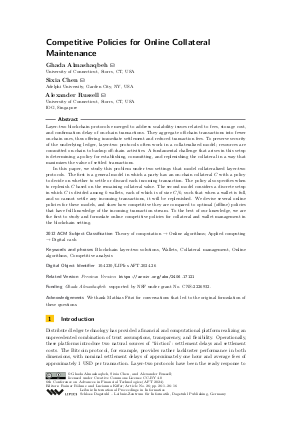LIPIcs.AFT.2024.26.pdf
- Filesize: 0.63 MB
- 16 pages

 Creative Commons Attribution 4.0 International license
Creative Commons Attribution 4.0 International license

Layer-two blockchain protocols emerged to address scalability issues related to fees, storage cost, and confirmation delay of on-chain transactions. They aggregate off-chain transactions into fewer on-chain ones, thus offering immediate settlement and reduced transaction fees. To preserve security of the underlying ledger, layer-two protocols often work in a collateralized model; resources are committed on-chain to backup off-chain activities. A fundamental challenge that arises in this setup is determining a policy for establishing, committing, and replenishing the collateral in a way that maximizes the value of settled transactions. In this paper, we study this problem under two settings that model collateralized layer-two protocols. The first is a general model in which a party has an on-chain collateral C with a policy to decide on whether to settle or discard each incoming transaction. The policy also specifies when to replenish C based on the remaining collateral value. The second model considers a discrete setup in which C is divided among k wallets, each of which is of size C/k, such that when a wallet is full, and so cannot settle any incoming transactions, it will be replenished. We devise several online policies for these models, and show how competitive they are compared to optimal (offline) policies that have full knowledge of the incoming transaction stream. To the best of our knowledge, we are the first to study and formulate online competitive policies for collateral and wallet management in the blockchain setting.















Feedback for Dagstuhl Publishing